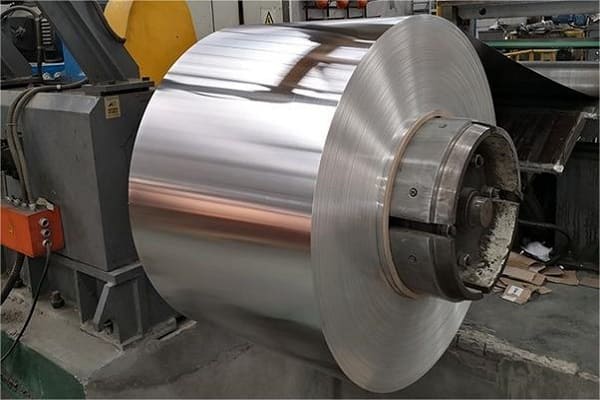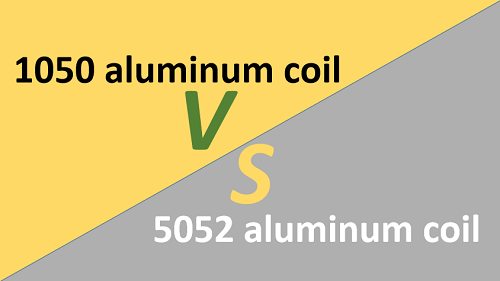5052 Aluminum Coil Product Introduction
Les 5052 la bobine d'aluminium est un alliage polyvalent et largement utilisé dans diverses industries, grâce à ses propriétés exceptionnelles et sa rentabilité. Ce guide détaillé approfondira les spécifications, avantages, applications, et les propriétés de 5052 bobine d'aluminium, fournir des informations précieuses aux professionnels dans divers domaines.
 5052 bobine d'aluminium
5052 bobine d'aluminiumContenu de l'élément de 5052 Bobine d'aluminium
| Élément | Percentage By Weight |
| Magnésium (mg) | 2.2% – 2.8% |
| Chrome (Cr) | 0.15% – 0.35% |
| Fer (Fe) | 0 – 0.4% |
| Silicium (Et) | 0 – 0.25% |
| Cuivre (Cu) | 0 – 0.1% |
| Manganèse (Mn) | 0 – 0.1% |
| Zinc (Zn) | 0 – 0.1% |
| Aluminium (Al) | The Remainder |
5052 Aluminum Coil Characteristics
- Alloy Designation: 5052
- Tempérer: O (recuit), H12, H14, H16, H18, H22, H24, H26, H28, H32, H34, H36, H38
- Finir: Mill finish, painted, coated
- Épaisseur: 0.2mm-12mm
- Largeur: 1000mm-2600mm
- Longueur: As per customer requirements
- Densité: 2.68 g/cm³ (refer to density data table below)
- Point de fusion: 637.2°C
- Boiling Point: 2519°C
5052 Aluminum Coil vs 6061 Bobine d'aluminium
| Propriété | 5052 Bobine d'aluminium | 6061 Bobine d'aluminium |
|---|
| Force | Lower | Plus haut |
| Résistance à la corrosion | Better | Bien |
| Soudabilité | Excellent | Bien |
| Heat Treatment | Not heat treatable | Heat treatable |
What Are The Advantages of 5052 Bobine d'aluminium?
- Rapport résistance/poids élevé: 5052 aluminum coil offers an impressive strength-to-weight ratio, making it suitable for applications where lightweight and durability are crucial.
- Excellent Corrosion Resistance: The alloy’s high magnesium content enhances its corrosion resistance, making it ideal for use in marine environments and harsh conditions.
- Good Weldability: 5052 aluminum coil exhibits excellent weldability, allowing for seamless joining of components without compromising strength or integrity.
- Formabilité: The coil’s high formability enables it to be shaped into complex geometries, making it suitable for intricate designs.
- Rentable: Compared to other aluminum alloys, 5052 aluminum coil offers a cost-effective solution for various applications.
 5052 fournisseur de bobines d'aluminium
5052 fournisseur de bobines d'aluminiumApplication de 5052 Bobine d'aluminium
The wide-ranging applications of 5052 aluminum coil include:
- Construction sector: Toiture, bardage, murs-rideaux, cadres de fenêtres
- Domaine de l'emballage: Cans, lids, déjouer, containers
- Automobile manufacturing field: Body panels, garniture, boucliers thermiques
- Furniture manufacturing and household appliances: Cabinets, comptoirs, réfrigérateurs, fours
- Electronics and power industry: Dissipateurs de chaleur, condensateurs, transformateurs
- Construction navale: Hulls, superstructures, ponts
- Transportation Facilities: Railcars, buses, aircraft
- Pipe insulation: Cladding, jacketing
- Appareils d'éclairage: Réflecteurs, housings
- Advertising signage: Billboards, panneaux, affiche
- Food and Beverage Packaging: Trays, lids, boîtes de conserve
5052 alloy grade aluminum coil representative
Each alloy grade has a four-digit number, tel que 5052. The first number represents the main alloy element of the grade or the series it belongs to. 5052 aluminum coil belongs to the 5000 alliage d'aluminium de série.
5052 aluminum coil belongs to grade 5000. It starts with the number 5 because its central alloying element is magnesium. Sometimes they also alloy manganese with magnesium in the 5000 séries.
The last two digits, 52, represent the level within the 5000-level category. These numbers distinguish them from other alloy grades such as 5059, 5083, 5086, etc.
5052 bobine d'aluminium vs 1050 bobine d'aluminium
5052 bobine d'aluminium et 1050 bobine d'aluminium are two different brands of aluminum alloy coils with different characteristics, performance and applications. 1050 coil and 5052 also have similar properties in terms of density and melting point.
 5052 bobine d'aluminium vs 1050 bobine d'aluminium
5052 bobine d'aluminium vs 1050 bobine d'aluminiumAlloy composition:
5052 aluminum coil is an alloy whose main components are aluminum, magnesium and a small amount of chromium and manganese. Belongs to 5xxx series aluminum alloy.
1050 aluminum coil is a pure aluminum alloy with a minimum aluminum content of 99.5%. Belongs to 1xxx series aluminum alloy.
Strength and hardness:
5052 aluminum coil is known for its excellent strength and high fatigue resistance. It has medium to high strength and is suitable for structural applications.
1050 aluminum coil is a pure aluminum alloy with relatively low strength compared to alloys such as 5052. It is softer and less strong, but more formable.
Résistance à la corrosion:
Les deux 5052 et 1050 aluminum coils have good corrosion resistance, mais 5052 performs better in harsh environments due to the presence of magnesium, which enhances its corrosion resistance, especially in marine applications.
Soudabilité:
Les deux 1050 et 5052 aluminum coil alloys can be easily welded using various techniques such as arc welding, MIG welding and TIG welding. toutefois, precautions should be taken to avoid weld cracking, especially with 5052 since it contains magnesium.
Formability and processability:
1050 aluminum coil is highly formable and processable, making it suitable for applications requiring complex shapes and deep drawing processes. Alors que 5052 aluminum coil is not as easy to form as 1050 aluminum coil due to its higher strength, it can still be formed using traditional methods, but may require more force and equipment.
Application:
5052 aluminum coil is commonly used in applications requiring high strength and corrosion resistance, such as marine components, truck trailers, pressure vessels and aircraft components.
1050 aluminum coil is commonly used in applications where formability and corrosion resistance are critical factors, such as cookware, échangeurs de chaleur, chemical equipment and reflectors.
